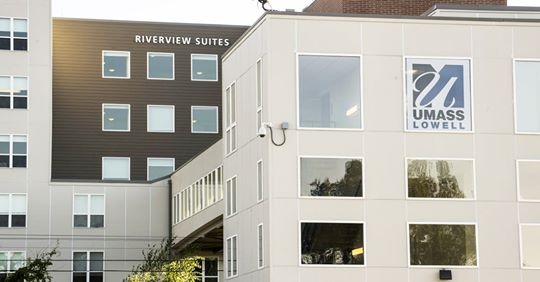You have /5 articles left.
Sign up for a free account or log in.

University of Massachusetts at Lowell
istockphoto.com/gmast3r
During this pandemic, something has been glossed over: the understanding that, out of necessity, a number of people live on college and university campuses year-round, making up a community of adaptable and resilient folks. I’ve been faculty in residence as part of a university living-learning community for three years now.
One of our residents was recently featured on PBS NewsHour in a segment discussing the responsibilities and obligations of academic institutions to support their most vulnerable populations and the degree to which students rely on colleges’ resources for support beyond academics and student services, including food, showers, laundry and internet access. While not the most optimistic tale, it was very well done, and the words needed to be put out into the world.
Like that student and the 265 remaining residential students with me, I do not have a home or family to which I can evacuate. (I also do not have savings, because the bulk of my income goes to paying off student loan and medical debt, but the debt crisis is a different story.)
So to all the folks now inviting students into their homes via webcam, welcome to my world, everyone, a place where there is no professorial mystique or mystery beyond what you have to offer in terms of education and advising. I’m in their space, they’re in my space -- let’s be respectful of each other’s space.
It’s been an interesting semester in residence life. During the first round of closures, my supervisor said, “We’re going to have to reassess what a residential curriculum looks like moving forward.” Then he left in mid-April to take a position at another university, and my fellow faculty member in residence bought a house and moved off campus. While I do my best to be entirely altruistic, I must admit my first concern was sudden homelessness. Knowing that, without the university, I do not have anywhere to go gives me a great deal of identification with my residents -- just as I draw on my own experiences with PTSD and traumatic brain injury when working with veterans and student athletes.
Last year at a faculty adviser training session in our living-learning community, we discussed Jean Twenge’s iGen and how difficult many people have found it to get students to engage with each other face-to-face. But in the shutdown, despite being physically distanced, students are engaging with each other. And a lot of our remote engagement programming and strategies can be employed successfully when and if larger populations of residential students return to college campuses.
In the before time, I’d run one or two events in the residence hall each week, in addition to holding drop-in hours and nightly doggo office hours, where Eleanor, my rescued Staffordshire terrier, hangs out in the doorway of the staff office and interacts with students. Now, for both students in residence and formerly residential students, I’m holding drop-in advising sessions through Slack and Discord, hosting webinars, organizing group watches of apocalypse and epistolary films, maintaining virtual bulletin boards through Padlet, joining students building and burning down parts of campuses in Minecraft games, and discussing grievances and providing support on Reddit. As a theater person, I think a lot about ways to apply the audience experiences of the Bioboxes project and ThirdWing to virtual residential life.
One of my mentees is also currently housed in the residence hall with me. We have an elaborate physical distancing strategy planned to award their post-thesis defense honors stole (our undergraduate version of doctoral hooding) via two mop handles across belt barricades. (I'm awarding most post-defense honors by stoling students' selfies on a tablet on a tripod.)
The most ambitious project I’ve been engaged with so far involved sourcing cloth face coverings for all students still in residence on our campus. Thanks to the wonderful folks of the Higher Ed Learning Collective, crafty staff and faculty members, and costumer friends, every student in residence who wants a cloth face mask can have one at no cost to them. (I started sourcing masks for 500 students; now we have half that number of residents, so everyone can have multiple face coverings.) It seemed especially pressing when a field hospital opened in the campus recreation center across the street from our residence hall.
Also significant to students' well-being has been making sure everyone knows about available mental health resources, remembering that I’m still a mandated reporter in remote academic spaces and providing on-demand, 24-7, in-house academic advising support, whether via 3 a.m. direct messages or by yelling across an empty event space at each other.
Another popular option has been the Off-Broadway Players student theater group (I’m their faculty adviser) hosting a virtual "Don’t Be Boring" event in which everyone is allotted five minutes to not be boring. This can encompass anything from ukulele solos to cooking ramen to monologuing about falling into the college student stimulus check gap.
Our aim is to continue programs and initiatives based on student feedback and distribute information about supports and opportunities without bombarding students with data overload. As we navigate the new not normal and rapid change to academic landscapes, looking for strategies to boost morale in a time of anxious expectation has never been more important.
Finally, I've been sending my students weekly self-assessments that include questions such as:
- Are you safe?
- What do you need? What resources would be most useful?
- Any questions, comments, concerns or complaints?
- What is your biggest fear right now?
- What are your biggest expectations?
- What is something you've learned over the past week that you'll apply in your life moving forward?
- How can universities best adapt to meet students' needs in hybrid contexts?
I’ve found it best to let folks be as involved or as distant as they desire. But it is important to reach out and check in with everyone and let them know that I’m available as an advising resource.
Sometimes we have hundreds of students turn up for a virtual ResLife event, and sometimes we have eight. The event with eight students is no more or less successful than the event with hundreds of students, and it provides some of the one-on-one personal interaction that should come with campus life.
Several weeks ago, the university announced that the students were being moved again out of my building and into another residence hall. I didn't know what that meant in terms of keeping the roof over my own head. Fortunately, we received word members of the residential staff will be relocated along with the students -- though we’re still waiting to find out when.
We persevere in pandemic pedagogy. I’ll run programming and thesis defenses and teach courses from the inside for as long as I am able. Risk, fail, risk again -- but also stay safe, everyone!








